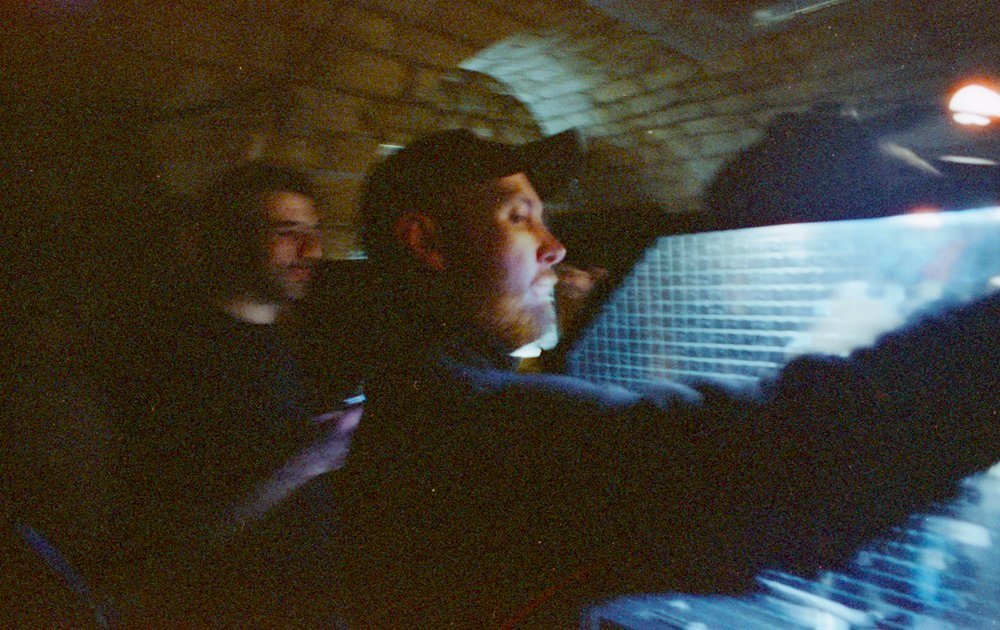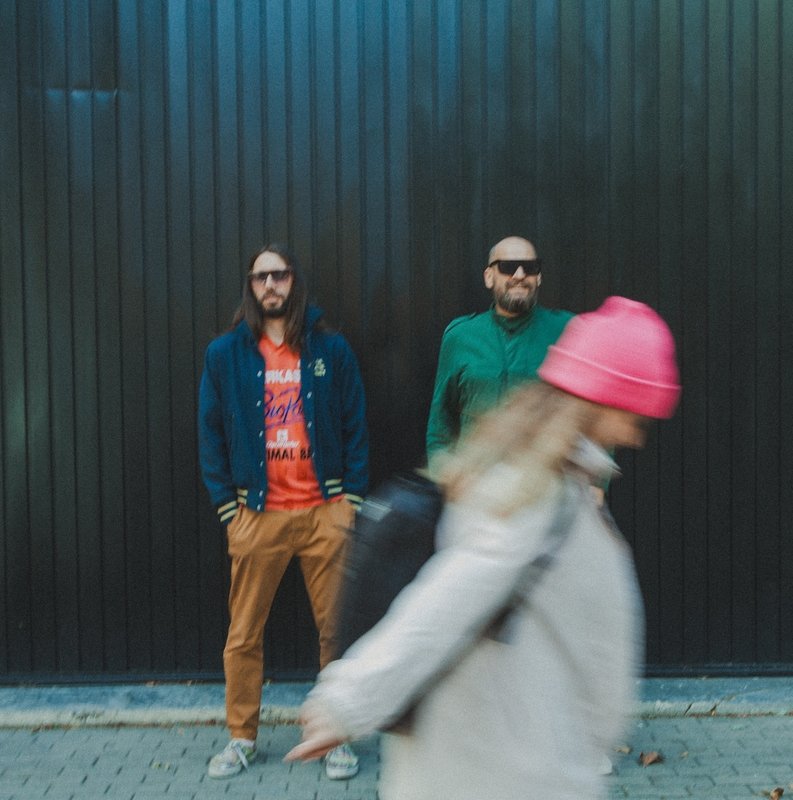
Alan Briand (aka Shelter) has been involved in the Paris scene for a number of years. He’s released music under his own Protopost label, and via imprints like Antinote, Growing Bin and International Feel. I caught up with him in the wake of January’s ‘ACID M:)DES’ drop to find out a bit more about his process and what’s happening in the French capital.
Paul East: Hi Alan, can you tell me a bit about how you got into producing, and music in general?
Alan Briand: I was working in a record shop with a friend of mine and that's how I started. Playing records while working in the shop, it really emphasized how they’re made, their purpose. I really started doing music because of working at the shop. I still work there as well as produce. It means I can find a lot of different music you don't really bump into on YouTube that often.
Paul East: How would you describe your sound?
Alan Briand: I'm always working on setups. I don't really want to get a specific sound out of anything, but I always want to pick something that’s relevant to the subject. For example, I'm mostly working with vintage stuff because they’re a time capsule of previous ways of making music. It's always interesting to get a texture from an instrument that comes from the past. To get that exact same vibe and sound that you can’t make with today's music production gear. That’s why I love tapes.
Paul East: You record as Shelter, do you produce under any other guises?
Alan Briand: No, I just use this one. It came from my first project with a friend, doing house music. We were influenced by music from Detroit so we called ourselves ‘Garage Shelter’ because of a Jovonn track that we really liked and nobody really knew in France then. At some point we just stopped working together because he went to live abroad and I kept the ‘Shelter’ part.
Paul East: So, do you take inspiration from that sound? Is it something you go back to?
Alan Briand: Yeah, but it's really something of fate. It's a step by step trip to get to electronic music. First with house music, and then you listen to minimal and techno and then you realize that a lot of people doing electronic stuff are into Disco…. And so you listen to all that and then you go back….if you listen to the funky stuff from the US, they are using live drummers and obviously there's a lot of musicianship involved and studio work. And so by then you really are very far away from where you started - it's a trip!
I still really like electronic music, but I really like the fact that it doesn't have to be a very segmented thing, like ‘I'll stick to dance music’. You can do so many things with it. I really want to explore the ambient thing. There's much more stuff to discover and to think about.
Paul East: So is that what you were trying to do with this release?
Alan Briand: Yes definitely. I think someone sent me the Charanjit Singh record and said, 'it's interesting, have a listen’. Then it really hit me, and it took me time to process it. I was shocked into thinking about how music works. It’s possible to make something that sounds really electronic - but it's actually not really what you think is electronic music!
I put it on as my ringtone and people were like, ‘what the f*** is that sound?’. There's so much stuff to say about it. I read up on it, and apparently some people found him and that he was an Indian electronic producer. They went to his home and interviewed him and said, 'you invented acid house'. And he said, ‘that’s what some people already told me - no, I hate house music!’ Wow, second blow! How has this guy made something that we can really relate to? The answer is not the machine, but in what they can do and what they cannot do.
Coming from Raga and Indian classical gives me ways of doing music I didn’t know before, but saying it's acid house. It's really a misunderstanding of what it is. It's a ‘ragging’ mode which is completely different from what techno and house music is. They come from different experiences of music.
Paul East: Have you got anything else lined up? What's your next project?
Alan Briand: Next project is a digidub thing. It was recorded live last year, we’re working on the design right now. It's classic digital stuff from the UK, but with a live element, a kind of a homage to that style. Stuart from Emotional is releasing it.
Paul East: Do you collect records? I guess working in the shop means you get exposed to a lot of things?
Alan Briand: There's many different styles of music that we enjoy there. We have a lot of rock music, electronic of course, but we really like everything - there's good stuff everywhere. Even minimalists from the 70s, stuff like that. It's really cheap. The shop is called Babaluma, after the Can album.
Paul East: What’s your take on the French music scene at the moment? I mean, do you feel part of it or anything like that, how would you describe what's going on in Paris?
Alan Briand: I think Paris is going through a bit of a shift. Although I'm getting a bit older now. So I don't go out to club stuff as much as I used to. I tend towards more live stuff now, experimental music that I discovered in Paris. There's a lot that’s really out there. Noise music, almost like concrete music with some electronic instruments and it's really fun to see all those people coming from different angles like jazz and improvisation. People are enjoying weird music without any beats whatsoever. I'm getting into that too because my way in was through Indian classical. I’m also a La Monte Young fan. In the 70’s you had rock and roll, then he just came in and said, 'hey we can do it differently' and everybody's like, 'you're right!'. So When I see those performances, I relate to them because it’s improvisation, music can be very exciting when it's just not meant to be recorded.
Paul East: Any acts that you can namecheck or that we should listen for?
Alan Briand: It's funny because most of the stuff I go to I don't even know the name! When I see a gig somewhere in a place, but that's usually programming interesting stuff - if I don't know the name it must be good! There's a venue just outside Paris called Les Instants Chavirés. Right now, its programming is amazing. Also Ranguénès, hosted by Gravats and PAM. Also La Sale Pépinière or LSP. Le Non Jazz is also very active right now. Le Montezuma is an interesting place for record heads, and wine enthusiasts! Le Chaire De Poule (bar) is also a nice hub for musicians with a bunch of live events and even monthly improvisation jam events hosted by Vomir.
Check out Tom Val. His label is called Omnison and he records as Orion Music Workshop or Orion for short. He became a friend of mine because he also comes from the record world as a collector. I saw him at a lot of flea markets or in Paris collecting free jazz stuff and he was getting into recording at the time too. Now we're working together and he's doing a lot of improvisation but also recording.
Paul East: So you play live as well?
Alan Briand: It's quite daunting for me to get out of the studio because I spent so much time there and I collected so much gear to play around with and I just don't know how to improvise on them sometimes. I collect vintage synthesisers. It sounds the best but when you get to play it's not working anymore or there's a bug…!
Paul East: Do you have more albums in your mind that you want to create in the future?
Alan Briand: The LP with Tom, is coming out on my own label. It's another record where all the tracks are inspired by the Paris noise scene, it’s going to be an LP of four tracks. They are 10 minutes each because we think that music should be 10 minutes at least, because otherwise you don't get into it!
Paul East: What's the name of your label?
Alan Briand: It's Protopost. There's one release from last year. I don’t know if it's going to be just a label for what I'm working on personally or if it's going to be something more communal. Who knows!
Paul East: Thanks Alan, that was great.
Alan Briand: Thanks!.
Photo credit - @mathiaskarlgontard

